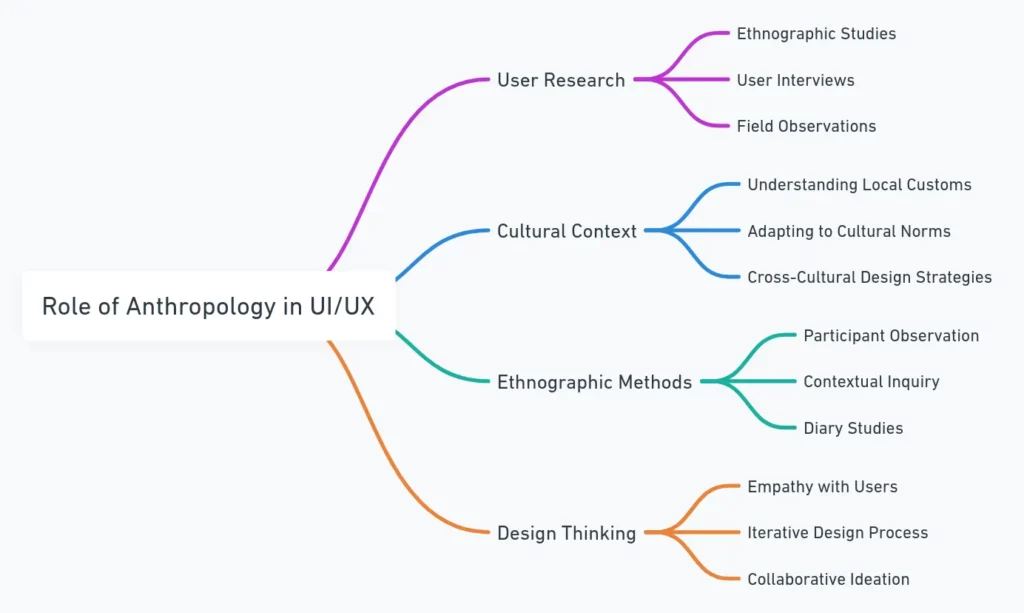AI Answer Evaluation Platform Live Now. Try Free Answer Evaluation Now
Role of Anthropology in UI/UX Research and Design
The world we live in today is interconnected through the World Wide Web, a network that transcends boundaries and brings people from diverse backgrounds together. This digital culture has given rise to a field known as UX research, which focuses on understanding and enhancing the experiences of users in the digital realm. However, the field of anthropology, which has long been fascinated by human culture and behavior, also has a significant role to play in the world of UI/UX research and design.

The Significance of Design Anthropology
Design anthropology has emerged as a crucial area of exploration, blending the principles of anthropology with the world of design. The realization that the Internet and digital culture require engaging experiences led to the integration of design in the development of online platforms. This shift from a focus on user interface to user experience emphasized the need for personalized and customized experiences. Anthropologists, with their expertise in understanding human behavior and culture, have a unique perspective to offer in this context.
Comparing Anthropology and UX Research
Anthropology and UX research share common ground in their focus on understanding human behavior and decision-making. Both fields strive to gain insights into the motivations and perspectives of individuals and communities, using qualitative data to inform their work. Anthropologists have long employed ethnographic methods, such as participant observation and in-depth interviews, to understand different cultures and societies. These methods align with the research techniques used in UX research, making anthropologists well-suited for the field.
The Anthropology of UX Research
Anthropologists bring valuable skills to the table when it comes to UX research. Their rigorous training in ethnographic methods makes them natural proponents of empathy, insights, and storytelling. Spending time in field settings, immersing themselves in different cultures, and building deep rapport with individuals and communities, anthropologists develop a unique understanding of human behavior and motivation. They excel in interpreting qualitative data and transforming it into meaningful stories that can guide UX design decisions.
Importance of “Thick Data” and Stories
UX research often relies on both big data and “thick data” to gain a comprehensive understanding of user behavior. While big data provides insights into the “hows” of user behavior, thick data delves into the “whys” behind those behaviors. Anthropologists, with their focus on qualitative research and storytelling, can contribute to the field of UX research by uncovering the underlying motivations and cultural factors that shape user experiences. This holistic approach helps create more meaningful and impactful user experiences.

The Need for a Design Change in Anthropology
Despite the natural alignment between anthropology and UX research, the field of anthropology has been slow to incorporate UX into its curriculum. Many anthropology programs still focus on traditional career paths such as museum curation or academic research. However, as the world becomes increasingly digital, there is a pressing need for a design change in anthropology. By embracing the potential of UX research and design, anthropology can better prepare the next generation of anthropologists to navigate the digital landscape.
Transitioning from Anthropology to UX Research
For anthropologists interested in transitioning to UX research, there are several steps to consider. First, independent learning is essential. Online courses, workshops, and books can provide a foundation in UX research principles and methods. Creating a UX portfolio is also crucial for showcasing practical skills and demonstrating an understanding of problem-solving in a UX context. Finally, updating your resume to highlight relevant experience and skills is essential when seeking opportunities in UX research.
The Future of Anthropology and UX Research
As the demand for UX researchers continues to grow, the field offers a promising career path for anthropologists. The skills and insights gained through anthropological training can be leveraged to make a real impact on user experience in the digital realm. By embracing the principles of UX research and design, anthropologists can contribute to creating better products, services, and experiences for users. It is up to the field of anthropology to recognize the potential of UX research and adapt its curriculum to prepare future anthropologists for the digital age.
Conclusion
Anthropology has a significant role to play in the world of UI/UX research and design. The field’s focus on understanding human behavior, culture, and motivations aligns closely with the goals of UX research. Anthropologists bring valuable skills such as empathy, insights, and storytelling to the table, providing a unique perspective in the digital realm. As the world becomes increasingly interconnected, it is crucial for the field of anthropology to embrace UX research and design to ensure the next generation of anthropologists is well-equipped to navigate the digital landscape. By combining anthropology and UX, we can create more meaningful and impactful user experiences that benefit individuals and communities around the world.




